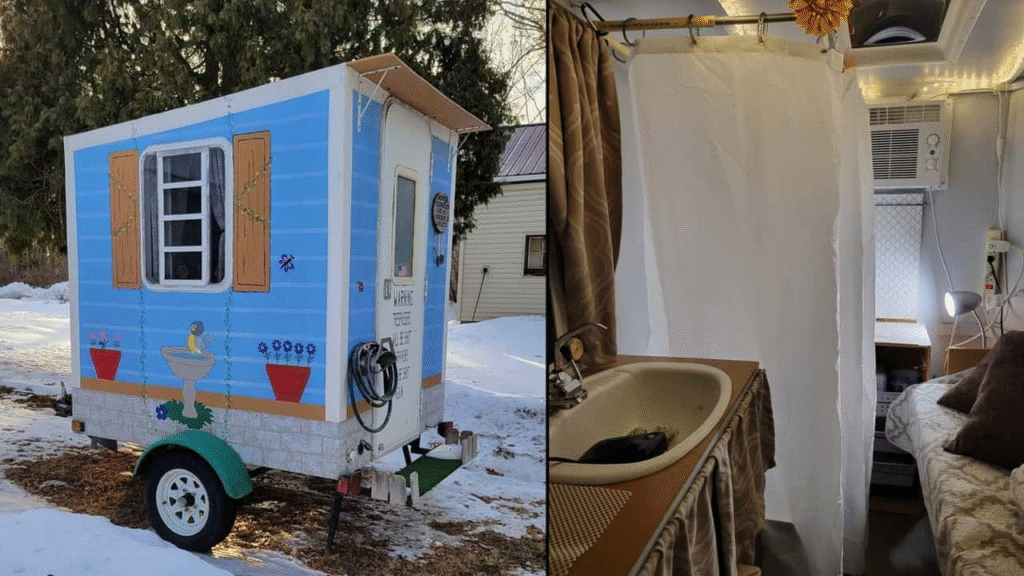RV Living Harsh Reality: Challenges and Facts About Life on Road

Discover the harsh reality of RV living. Learn about the challenges, drawbacks, and how to prepare for full-time life on the road with honesty and practical advice.
Introduction
The dream of RV living—freedom, adventure, and a minimalist lifestyle—draws many. But the harsh reality of life on wheels is often glossed over in social media and travel blogs.
Living full-time in an RV presents unique challenges that require preparation, resilience, and adaptability.
This guide reveals the less glamorous side of the RV lifestyle, offering insight into what to expect and how to manage the difficulties.
Common Challenges in RV Living

RV Living Dream
Limited Space and Storage
Adjusting to small living quarters means embracing significant downsizing. It can lead to feelings of confinement and a constant need for organization to prevent clutter buildup.
Maintenance and Repairs
RVs require ongoing upkeep of mechanical systems, plumbing, and electrical components. Unexpected repairs or breakdowns can be costly and inconvenient, especially far from service centers.
Weather and Climate Struggles
Extreme temperatures, humidity, and storms test RV insulation and comfort levels. Living through harsh weather requires preparation and sometimes creative solutions.
Privacy and Social Isolation
Living in tight spaces and moving frequently can reduce privacy. Forming lasting social connections is challenging when neighbors come and go.
Connectivity Issues
Reliable internet and phone signal are vital but not guaranteed in remote or rural areas. Investing in signal boosters or mobile hotspots is often necessary.
Financial Realities and Unexpected Costs
Though RV living can reduce housing costs, expenses like fuel, campground fees, insurance, and repairs quickly add up. Budgeting for surprises is crucial.
Legal and Logistical Complexities
Establishing residency, vehicle registration, mail forwarding, and voting logistics require thoughtful planning for full-time RVers.
Emotional and Psychological Truths
- Loneliness and homesickness occasionally affect RVers.
- Constant travel can be exciting but also exhausting.
- Adapting daily routines to small spaces demands patience and creativity.
Preparing for the Harsh Reality of RV Living: A Deep Dive
Living full-time in an RV offers unparalleled freedom and adventure, but it also comes with real, tangible challenges. Proper preparation helps you face these challenges confidently, reducing stress and increasing enjoyment. Below are key areas to focus on as you prepare for the less glamorous side of RV life.
1. Budget Realistically and Build an Emergency Fund
- Create a detailed budget: Include fixed costs like insurance, campground fees, propane, and variable expenses such as fuel, maintenance, and groceries.
- Factor in irregular expenses: Major repairs, replacements, and healthcare costs can arise unexpectedly. Create a separate emergency fund for these.
- Monitor spending: Track expenses consistently to identify areas where you can save and plan ahead for upcoming large payments.
- Plan for seasonal cost swings: Sometimes you’ll pay more for heating in winter or fuel during long drives.
2. Learn Basic Mechanical and Maintenance Skills
- Understand your RV’s systems: Study your vehicle’s engine, tires, water, electrical, and plumbing systems. Manuals and online tutorials are great resources.
- Perform regular maintenance: Simple tasks like checking tire pressure, changing filters, or monitoring battery health prevent bigger issues.
- Keep essential tools and spare parts: Items like a tire inflator, pump repair kits, fuses, belts, and hoses should be on hand.
- Build a trusted service network: Research mechanics, RV parks with maintenance services, and mobile RV techs along your common routes.
- Loneliness and homesickness occasionally affect RVers.
- Constant travel can be exciting but also exhausting.
- Adapting daily routines to small spaces demands patience and creativity.
- Create a detailed budget: Include fixed costs like insurance, campground fees, propane, and variable expenses such as fuel, maintenance, and groceries.
- Factor in irregular expenses: Major repairs, replacements, and healthcare costs can arise unexpectedly. Create a separate emergency fund for these.
- Monitor spending: Track expenses consistently to identify areas where you can save and plan ahead for upcoming large payments.
- Plan for seasonal cost swings: Sometimes you’ll pay more for heating in winter or fuel during long drives.
- Understand your RV’s systems: Study your vehicle’s engine, tires, water, electrical, and plumbing systems. Manuals and online tutorials are great resources.
- Perform regular maintenance: Simple tasks like checking tire pressure, changing filters, or monitoring battery health prevent bigger issues.
- Keep essential tools and spare parts: Items like a tire inflator, pump repair kits, fuses, belts, and hoses should be on hand.
3. Invest in Comfort Upgrades and Reliable Systems
- Upgrade HVAC Systems: Consider installing more efficient air conditioners or heaters suited for your region to improve comfort during extreme weather.
- Install High-Quality Vent Fans: Proper ventilation prevents moisture buildup, reduces odors, and improves air circulation inside your RV.
- Use Memory Foam or Custom Mattresses: Sleeping comfortably is vital; upgrading your mattress can greatly improve rest and overall health.
- Add Window Reflectors and Insulating Curtains: These help regulate indoor temperature, reduce glare, and increase privacy.
- Integrate Smart Home Technology: Smart thermostats, lighting, and leak detectors enhance convenience and safety on the road.
- Opt for LED Lighting: LEDs consume less power, generate less heat, and provide better illumination, which is important in small spaces.
- Install Backup Camera Systems: Enhances safety and ease of driving or parking your RV, especially for larger rigs.
- Upgrade Water Filtration Systems: Clean, safe water improves quality of life and health; consider multi-stage filtration for better taste and safety.
- Use Solar Tracking Panels: Solar panels with tracking can capture more sunlight efficiently, increasing power generation off-grid.
- Include Awning and Outdoor Living Enhancements: Comfortable outdoor spaces like awnings, mats, and portable furniture expand living areas and enjoyment.
These additions can elevate your daily living experience and make full-time RV life more sustainable and comfortable
4. Build Social Support and Connections
- Join RV clubs and online communities: These offer emotional support, practical advice, and opportunities to meet like-minded travelers.
- Attend rallies, meetups, and events: In-person gatherings help build friendships and reduce isolation.
- Stay connected with family and friends: Use video calls, social media, and messaging apps regularly.
- Volunteer or participate locally: Engaging in communities where you visit builds a sense of place and belonging.
5. Embrace Minimalism and Intentional Living
- Assess what you really need: Commit to owning items that serve a purpose or bring joy.
- Regularly declutter: Continuously evaluate possessions to prevent accumulation that crowds your space.
- Adopt multifunctional and space-saving gear: Collapsible, portable, or convertible tools and furniture maximize living efficiency.
- Simplify routines: Cook easy meals, streamline cleaning rituals, and automate chores when possible.
6. Cultivate Patience, Resilience, and Flexibility
- Accept unpredictability: Weather delays, mechanical issues, or campground shortages will happen. Cultivate patience to manage stress when plans shift.
- Develop problem-solving skills: Practice creativity and resourcefulness when facing obstacles in tight spaces or unfamiliar settings.
- Adjust expectations: Not every day on the road will be idyllic—embrace imperfection and learn from challenges.
- Prioritize self-care: Regular exercise, healthy eating, rest, and mental health breaks sustain energy and positivity.
7. Legal and Administrative Preparation
- Choose a domicile state: Research states offering favorable tax, vehicle registration, and voting options for full-time RVers.
- Set up mail forwarding: Use mail services specializing in RV lifestyles to receive and manage postal mail securely.
- Understand insurance needs: Health, vehicle, and personal property insurance must cover your mobile lifestyle comprehensively.
- Keep all documents accessible: Store digital copies of insurance, registration, medical info, and identification for emergencies and checkpoints.
Challenges and Truths About Life on the Road
The dream of RV living—freedom, adventure, and a minimalist lifestyle—attracts many people yearning to escape the conventional nine-to-five grind and explore new places. However, the harsh reality of full-time life on wheels is often glossed over by social media highlights and rosy travel blogs. While RV living offers incredible rewards, it also comes with unique challenges that require careful preparation, patience, and adaptability.
This guide unpacks the less glamorous side of the RV lifestyle, offering an honest look at what to expect and how to successfully navigate the difficulties.
Common Challenges in RV Living
Limited Space and Storage

Minimalistic RV Living
One of the first hurdles for new full-time RVers is adjusting to significantly downsized living spaces. Unlike traditional homes with closets, garages, and basements, the confined quarters of an RV demand ruthless decluttering and smart storage solutions. Clutter can quickly lead to stress and make life feel cramped.
Maintenance and Repairs
RVs are complex machines combining vehicle mechanics and home utilities. Regular maintenance of the engine, tires, brakes, plumbing, HVAC, and electrical systems is necessary to avoid breakdowns. Unexpected repairs can be expensive and inconvenient, especially if you are far from trusted service providers.
Weather and Climate Struggles
RVs generally have less insulation and weatherproofing than traditional housing. Extreme heat, cold, rain, or humidity can make living conditions uncomfortable. Storms can also force you to relocate urgently, disrupting plans and routines.
Privacy and Social Isolation
Living in an RV often means close proximity to strangers at campgrounds or parking areas and frequently moving, which can limit the formation of deep social connections. Solitude is a double-edged sword; it can be enjoyed, but also feel lonely without a supportive community.
Connectivity Issues
For those working remotely or maintaining a digital life, inconsistent cellular or Wi-Fi connectivity is a common frustration. Investing in mobile hotspots, signal boosters, and reliable internet providers is often necessary but can add to the cost.
Financial Realities and Unexpected Expenses
While RV living can reduce or eliminate rent or mortgage payments, other expenses become significant. These include fuel costs, campground fees, vehicle maintenance, health insurance, and sometimes state registration fees. Budgeting with a cushion for these unpredictable costs is vital.
Legal and Logistical Complexities
Choosing a legal domicile, vehicle and driver registration, managing mail forwarding, and staying up to date with voting requirements present extra administrative challenges that must be handled thoughtfully.
Emotional and Psychological Truths
- Loneliness and Homesickness: Even the most extroverted RVers may at times feel disconnected from friends, family, and community. Creating virtual connections and seeking out social RV groups helps combat this.
- Constant Change: The continual travel and new environments can be energizing yet exhausting. Stability can be elusive without routines.
- Adaptation: Life in a small space demands flexibility and creative problem-solving. It takes time to make an RV feel like home.
Preparing for the Harsh Reality of RV Living
- Budget Realistically: Account for fuel, maintenance, camping fees, insurance, health care, and replacements. Build an emergency fund.
- Learn Mechanical Skills: Basic engine and appliance knowledge reduces reliance on mechanics and saves money.
- Upgrade and Insulate: Invest in good insulation, solar power, upgraded batteries, and reliable internet solutions to improve comfort and independence.
- Build Community: Join RV clubs, attend rallies, and participate in social media groups to create supportive networks.
- Embrace Minimalism: Letting go of unnecessary possessions eases spatial and mental stress and suits life on the road.
- Develop Patience and Flexibility: Unexpected events are inevitable. Cultivating a calm and adaptable mindset makes the journey smoother.
Tips and tricks for managing the reality of RV life
Before you commit
- Rent before you buy. Before spending tens of thousands on an RV, rent one for an extended trip. This will give you a taste of the lifestyle, including the unexpected challenges, before you fully commit.
- Expect disapproval. Not everyone will understand or support your choice to live in an RV. Prepare to encounter pushback from friends and family who may question your decisions.
- Learn to be a minimalist. A major part of the transition is downsizing your possessions. Many RVers recommend a decluttering method like the 30-day challenge, where you get rid of a corresponding number of items each day of the month.
On the road
- Master basic maintenance. Learning how to perform basic repairs will save you significant time and money. Always have some essential tools on hand, including a high-quality sealant for leaks.
- Use the 3-3-3 rule for a better experience. To avoid burnout, follow this guideline: Drive no more than 3 hours a day and no more than 300 miles, and stay at least 3 days at each location. This makes the travel more enjoyable and less stressful.
- Prioritize safety checks. Before driving off, perform a perimeter check to ensure everything is secured and nothing is left behind. Always know the height of your RV and look out for height restriction signs.
- Prepare for internet challenges. While some campgrounds offer Wi-Fi, it is often unreliable. Be prepared to invest in your own costly but essential internet solution, such as a cellular hotspot or Starlink.
Interior and organization hacks
- Use creative storage. Utilize vertical space with over-the-door hooks for towels and coats. Mount turning caddies in corner spaces and use tension rods in cabinets to keep items from shifting during travel.
- Improve your oven. RV ovens can heat unevenly. Placing a pizza stone inside can help distribute the heat more consistently.
- Upgrade your refrigerator. Improve air circulation in your RV refrigerator by not overpacking it and adding a small fan inside and at the outside access point.
- Level your workspace. Use small cardboard shims to level your cooking surface and prevent food from running off your pan.
Final Thoughts
Preparation is your strongest ally in facing the harsh realities of RV living.
The more thoroughly you plan your finances, maintenance, social network, and mindset, the more you’ll enjoy the remarkable lifestyle RV life offers—complete with its unique challenges and incredible freedom.
Conclusion
The adventure and freedom of the RV living lifestyle come wrapped in a fabric of real challenges. Recognizing the harsh realities—from cramped spaces and vehicle upkeep to social isolation and financial uncertainties—allows you to plan accordingly and face them head-on.
With preparation, a supportive community, and the right mindset, the rewards of life on the road far outweigh the hardships.
The harsh reality of RV living includes challenges alongside freedom and adventure. Understanding these truths prepares you for a sustainable, fulfilling life on the road. With preparation and adaptability, the rewards of this lifestyle outweigh its difficulties.
If you want, I can create additional guides on budgeting for RV life, maintenance tips, or managing mental health on the road!
FAQ
Q: Is RV living harder than expected?
Often yes, especially initially. Preparation and mindset make a big difference.
Q: How do RVers handle loneliness?
Building community, both online and in person, helps.
Q: What surprises new RVers most?
Maintenance demands and weather extremes are common surprises.
Q: Is RV living harder than it looks?
Yes, many beginners are surprised by the level of work involved, especially in the first year. Preparation and realistic expectations are key.
Q: How do RVers cope with loneliness?
They maintain strong online and offline social connections, join local and national RV groups, and keep in touch with family and friends.
Q: What surprises most new full-time RVers?
The ongoing maintenance, weather extremes, limited space, and administrative tasks, such as residency and mail handling.
